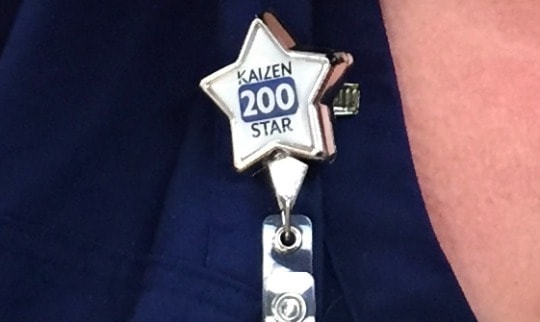Last Wednesday, I gave a presentation on Lean, Kaizen, and continuous improvement for healthcare at the Dutch Lean Event conference. The organizers said they want their event to be a “festival” with a fun atmosphere.
They had a DJ (you read that right) playing lively music the whole time during networking breaks, even at 8:30 in the morning.

They kicked off the formal program with the Pharrell Williams song “Happy” and they had everybody dance around a little bit as we introduced ourselves to each other:
#LeanEvent is underway in The Netherlands pic.twitter.com/E5RTnwD1u5
— Mark Graban (@MarkGraban) November 5, 2014
It made me reflect a bit that Lean and Kaizen makes people happy. Yet, we sometimes sadly hear complaints about Lean and how people feel put out in some way. When that's happening, maybe it's not really Lean?
Lean isn't about forcing people to change. Lean is about engaging everybody in improvement. The Kaizen methodology, especially, engages everybody in improvements that matter to them and their patients. This isn't about “managing change,” it's about engaging people.
If you can, I suggest that you let the song play while you read this post:
It's not hard to find pictures of smiling faces in our book Healthcare Kaizen. My co-author's health system, Franciscan St. Francis, documents their Kaizens (over 20,000 to date) and you often see pictures with smiling faces. Kaizen brings joy to people and that's an important part of their mission and values at the Catholic health system… to heal and bring joy.

In the upper left of my photo collage, we have Debbie… an employee from housekeeping who initiated and implemented Franciscan's very first Kaizen in 2007. She found a way to keep coffee filters from getting dirty. Making an improvement brings joy and pride to people. It was her idea and her manager let her test it out.
In the lower right are two people from UMass Memorial Medical Center, showing off their Kaizen board during my recent visit.
The women in the pink and white cardigans work in the Franciscan NICU. I took these pictures last month during a visit as they showed off some of their Kaizen improvements (a video about this will be published here soon). The woman in the upper right works in endoscopy and she's implemented over 200 Kaizens (and she has a badge holder to show it) — and a video with her will appear here on Wednesday.

When I hear complaints about Lean, it makes me shake my head. But, I understand why it happens.
When I started a project at an NHS hospital in England back in 2008, I gave an initial presentation about Lean to pathology staff. A woman in the back row spoke up and said:
“Lean is nothing but a pain in me bum!!!”
Imagine the accent.
I talked to her after the presentation. I asked her why she felt that way. Well, she had a bad experience. There had previously been a clumsy “Kaizen event” where a consultant had come in and forced change on people.
As the late Peter Scholtes said:
“People don't resist change, they resist being changed.”
The pathology employee was right to be cheesed off. She hadn't been respected… so arguably that Kaizen event wasn't really a Lean process.
I worked to show her how things could be different.
People love to improve. In healthcare, there's so much intrinsic motivation to make things better for the patients and for their co-workers. Who doesn't want to make their own work less frustrating?
Some people are afraid to speak up… remnants of an old culture where people got in trouble for speaking up and pointing out problems… a culture where their ideas might have been ignored or belittled. That makes people sad.
Kaizen makes people happy. Lean should make people happy, too.
When our ideas are listened to and we're allowed to test changes (to see if they're really improvements), people feel pride and joy. This builds upon their intrinsic motivation so they want to participate again. Kaizen becomes a way of thinking and a way of life. It's no longer something you have to worry about sustaining.
When looking at the world of problems in healthcare, it's easy to get frustrated. We have BIG problems to solve (patient harm and deaths due to preventable errors being one of them). Waiting times are too long. Costs are too high and rising. These are big problems with big gaps. They require big solutions (or sometimes, lots of little solutions).
When we try to solve a huge problem, it might take a long time. Big projects might not succeed. This can wear us out. But, we must continue to try.
Solving small problems, through Kaizen, is faster and easier. Our “failures” are smaller and less impactful. We can feel good about improvement, bounce back from small setbacks, and keep making progress through baby steps.
I think the smiles and successes from small Kaizen can not just make us happy… it can also be the fuel that recharges us to continue also working on the big things.
Does Lean and Kaizen create frowns or smiles in your organization?
Please scroll down (or click) to post a comment. Connect with me on LinkedIn.
Let’s work together to build a culture of continuous improvement and psychological safety. If you're a leader looking to create lasting change—not just projects—I help organizations:
- Engage people at all levels in sustainable improvement
- Shift from fear of mistakes to learning from them
- Apply Lean thinking in practical, people-centered ways
Interested in coaching or a keynote talk? Let’s start a conversation.









